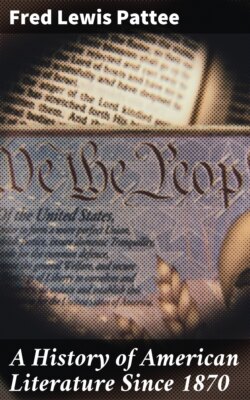Читать книгу A History of American Literature Since 1870 - Fred Lewis Pattee - Страница 45
На сайте Литреса книга снята с продажи.
V
ОглавлениеTable of Contents
Edward Eggleston was born in Vevay, Indiana, December 10, 1837. His father, a member of an old Virginia family, after a brilliant course at William and Mary College, had migrated westward, settled in Indiana, and just as he was making himself a notable figure in the law and the politics of his State, had died when his eldest son, Edward, was but nine years old. The son had inherited both his father's intellectual brilliancy and his frail physique. Though eager for knowledge, he was able all through his boyhood to attend school but little, and, though his father had provided for a college scholarship, the son never found himself able to take advantage of it. He was largely self-educated. He studied whenever he could, and by making use of all his opportunities he was able before he was twenty to master by himself nearly all of the branches required for a college degree.
His boyhood was a wandering one. After the death of his father, the family removed to New Albany and later to Madison. At the age of thirteen he was sent to southern Indiana to live with an uncle, a large landowner, and it was here in the lowlands of Decatur County that he had his first chance to study those primitive Hoosier types that later he was to make permanent in literature. Still later he lived for a year and a half with his father's people in Virginia.
Before he was nineteen he had chosen his profession. The tense Methodist atmosphere in which he had been reared had had its effect. He would be a preacher, a circuit rider, one of those tireless latter-day apostles that had formed so picturesque a part of his boyhood. "How did he get his theological education? It used to be said that Methodist preachers were educated by the old ones telling the young ones all they knew; but besides this oral instruction [he] carried in his saddle bags John Wesley's simple, solid sermons, Charles Wesley's hymns, and a Bible."[60]
Eggleston's saddle bags contained far more than these. He read Whitfield and Thomas à Kempis, the Œdipus Tyrannus in the Greek, and all the history and biography that he could buy or borrow. His "appointment" was in southeastern Indiana, a four-weeks' circuit with ten preaching places far apart in the Ohio River bottoms with their scattering population of malarial Pikes and their rude border civilization. He began his work with enthusiasm. He lived with his people; he entered intimately into their affairs; he studied at first hand their habits of life and of thought. It was an ideal preparation for a novelist, but the rough life was in no way fitted for his frail physique. After six months he broke down almost completely and was sent into the pine forests of Minnesota to recuperate. For several years he was connected with the Minnesota conference. He held pastorates in St. Paul and other places, but his health still continuing precarious, he at length retired to Chicago as an editor of the Little Corporal, a juvenile paper later merged in St. Nicholas. This step turned his attention to literature as a profession. From Chicago he was called to Brooklyn to the staff of the Independent, of which he later became the editor, and the rest of his life, save for a five years' pastorate in Brooklyn, he devoted to literature.
